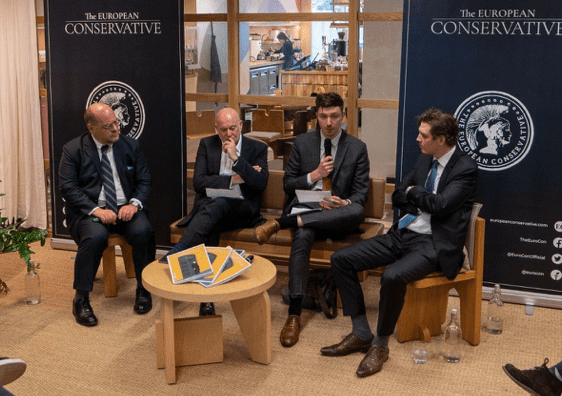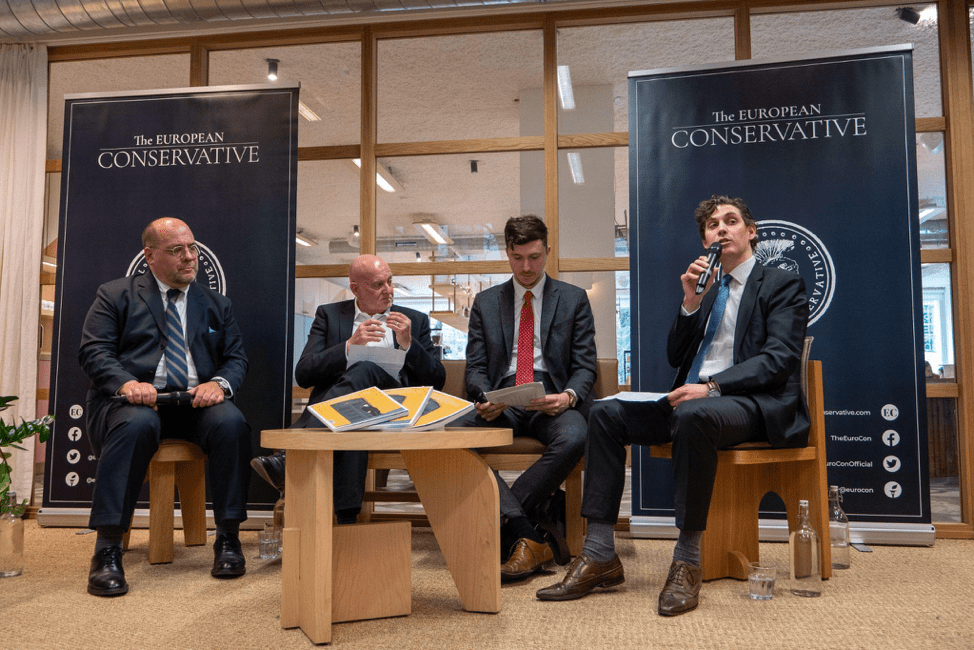
The European Commission’s ‘legislative priorities’ for 2023 and 2024 promise big things: a “human-centric” approach based on “fundamental principles of mutual trust” that are sure to create “opportunities for European citizens.” But dig beneath the surface and what do you find?
This was the theme of discussion at the first panel in a series of monthly events to come, hosted on Wednesday, March 22, by The European Conservative in Brussels. Editor-in-chief Alvino-Mario Fantini was joined by a panel of experts to discuss three of the Commission’s six priorities: the ‘digital transition,’ migration, and the ‘Green Deal.’ The stakes are high, given that in the Commission’s own words, “delivery on these priorities” will help form decisions ahead of the 2024 European elections.

Mr. Fantini began by stressing the need to “engage critically and perhaps push back against some of the policies and—let’s call a spade a spade—some of the propaganda.”
This, Dr. Norman Lewis agreed, was a crucial point. The managing director of Futures-Diagnosis Ltd. and a visiting research fellow at MCC Brussels, Dr. Lewis spoke eloquently about the ‘digital transition.’ He said the positive Brussels literature surrounding this topic makes one think: “Who could disagree with that.” But, “when you actually get beyond the rhetoric, you see something very different.” (Pierre-Marie Sève, Director of Institut pour la Justice (Institute for Justice), later added that “I believe what I see,” particularly when this differs from what is said.)

The Commission describes its desire to pursue a “human-centric approach” on digital matters, but Dr. Lewis has his doubts, suggesting that the plan has not been based on consultation with citizens and is really geared towards “play[ing] geopolitics, where the EU is very weak.” Beyond this, he added, bureaucrats are passing “content regulation” legislation which dictates “what can and cannot be said on the internet,” and are also regulating innovation, for instance in AI, which “really does not serve the people of Europe.” Dr. Lewis’s portrayal of the legislative priorities amounted to a “dictatorship of the experts”—a far cry from the “human-centric” system described in the official documents.
Mr. Sève, whose French-based think-tank is dedicated to justice, security, and migration, was equally critical on the topic of migration. Just as Mr. Fantini highlighted the use of “noble, lofty-sounding phases” to “make opaque things that people don’t want you to understand fully,” Mr. Sève scolded Brussels for talking about “common European values” while promoting “individual rights” against the common interest of Europeans. The values themselves, he added, were once numbered in the single digits but now add up to the dozens—and, the speakers asked, to what end? Another example of “mission creep,” Mr. Fantini declared.
Pieter Cleppe, the event’s final speaker, is editor-in-chief of brusselsreport.eu and an international research fellow at the U.S. think-tank Property Rights Alliance. He noted that on the ‘Green Deal,’ the rhetoric is also soft while, in reality, Europeans are witnessing the “sharpening up of already sharp regulations.”
The delivery of the ‘Green Deal,’ it should be noted, is the first of the Commission’s priorities—“no coincidence,” says Mr. Fantini, given that it “encompasses all aspects of our lives.” But Mr. Cleppe questioned the motive for change. If the European Union was serious about reducing CO2 emissions, he said, it would surely “love nuclear,” yet Brussels keeps somewhat of a distance from this resource: the term is excluded from its priorities paper. The policy analyst described the Commission’s green agenda as “completely out of control,” and highlighted that if its proposed changes were so great, people would “naturally adopt” them anyway. Political leaders, he said, prefer instead to ban “existing functional technology,” such as the combustion engine. The innovation it hopes to replace “functional technology” with could, Mr. Cleppe concluded, be summarised as “spending more money.”
At the beginning of the event, Mr. Fantini noted that many of the Commission’s legislative priorities fail to ask the “most important question”—that is, how will they impact Europeans? Towards the end, the speakers united in pinning their hopes on democracy to keep the Commission’s legislation in check.

Mr. Cleppe stressed that despite recent political damage, “I still believe in the ballot box.” He pointed to this month’s victory of the Dutch pro-farmer party BoerBurgerBeweging and, on a larger scale, the 2016 ‘Brexit’ vote. Dr. Lewis suggested that such events—or “shocks,” as Mr. Cleppe dubbed them—should ensure that EU leaders “don’t forget who the people are.” But recent opposition successes must not act as a prerequisite for Commission critics to let their guards down; Mr. Sève said, instead, given democracy will not be handed down “as a gift, we have to take it.” Power, he added, “is a matter of fighting, not begging.” The panel, however, agreed that it was not easy to determine how power through democracy can be taken, in both a peaceful and, ultimately, effective manner.
This will undoubtedly form a part of discussions in future events to be hosted by The European Conservative, details of which will be released soon.
